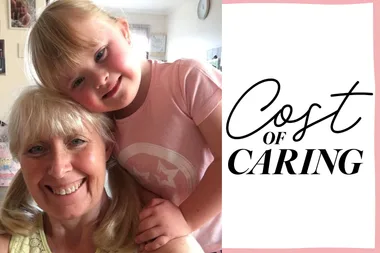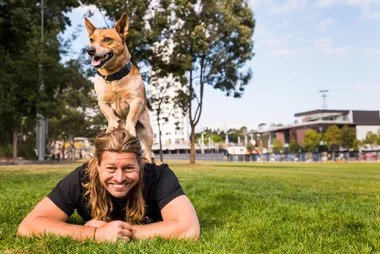**Dear Judy,
I was wondering if you could advise me on how I can manage my lifestyle and eating better. I live at home with my dad, but I only see him for one meal a week. The rest is up to me, and I dislike cooking so if there are leftovers I pick at them. I am a vegetarian, but I do eat seafood and find that with my job and uni I eat convenience foods which can be quite expensive. I miss home-cooked meals! But I have no problem getting my 2 and 5.
I’m 1.74m, weigh 58kg and am fairly active by involving myself in sports and going to the gym. I do weights twice a week and wish to tone up more by lowering my carbohydrate and fat intake, while increasing my protein intake but, being a vegetarian, that’s not always easy.
My lifestyle is busy involving work, uni, volunteer and sporting commitments along with partying (roughly two nights a week of drinking four alcoholic drinks)! My job involves driving around in a car all day and, being in the car I get nibbling cravings for lollies and nuts which is quite unhealthy and I do not know what to do about it! What do you suggest?
— Victoria**
Dear Victoria,
I do appreciate how hard it can be to get into the habit of eating well when you lead such a busy life, and it’s great that you do so much exercise, but you are verging on being slightly underweight. Your BMI is 19.2 and the BMI range for normal healthy weight is between 19.0 and 24.
I presume you are under the age of 25, which means you still have some further growth and development to go. That being the case it is very important to eat well and not reduce the amount you eat but change what you eat.
Protein is necessary for growth and repair and therefore it’s important for you to focus on finding protein at every meal.
Being a fish-eating vegetarian there are fewer animal proteins available to you but you will find small amounts of protein in wholegrain foods. Rolled oats, brown rice, wholegrain bread, quinoa and bulghur all contain some amount of protein, and legumes, such as chickpeas, kidney beans, cannellini beans and lentils when they are served with a wholegrain food combine to make complete protein. As well, low-fat dairy foods, eggs, fish and seafood, soy products, nuts and nut spreads are all good sources of protein.
Step 1: Lock in breakfast
Make a habit of getting up in time to enjoy a good breakfast. Natural muesli with rolled oats, chopped nuts and dried fruit is a great start. Chop fresh fruit into it and serve it with low fat natural yoghurt. Yoghurt lasts longer in the fridge than milk so you don’t need to worry about it going off.
Other choices include boiled eggs and wholegrain toast (make extra eggs to eat as snacks).
Step 2: Lock in snacks
If you are on the road a lot then it’s a good idea to carry a small cool pack to carry some snacks around.
Here are some easy to transport snacks to take on the road with you:
Raw nuts and seeds, fresh fruit, 30g cheese, small tub yoghurt, smoked tofu cubes, corn thins or rice cakes with tahini or nut spread or hummus, cottage cheese and chopped apple with walnuts, hard boiled egg with tomato on wholegrain crackers.
Step 3: Find a good lunch
Lunch is usually quite easy to gather while you’re out and about and you can’t go past a good old sandwich, provided you fill it with the right stuff. The one problem can be finding a sandwich bar that uses decent bread but you can usually find wholegrain or a brown seeded roll if you get there early and beat the rush. Pack the sandwich with salad, use avocado instead of butter and get protein from tuna, salmon or egg. If you can find a felafel bar then a felafel wrapped in Lebanese bread with salad and hummus is hard to beat.
Step 4: Dinner
You said something very pertinent — you miss home cooked food. It is so lucky that you feel that way because some people don’t like food and for them it’s an uphill battle maintaining good health. Every young person who feels the way you do, at some stage in life realises, if you miss it it’s up to you to learn to make it yourself.
On the nights you are home try to make a nice dinner. Buy a basic cookbook and experiment with cooking and make enough for the next day. There’s nothing wrong with leftovers provided you boost them with fresh vegetables the next day. For example, if you make a pot of chilli beans and rice, serve it with salad on the day of making and the next day have the beans in a taco shell or pita bread with some more fresh salad and grated cheese.
When you don’t have much time, certain frozen foods can be a good fall-back.
Frozen ravioli is a quick and healthy meal — it’s delicious served with a quality pasta sauce and green salad. Use half the bottle of pasta sauce one evening with the pasta and the other half with sautéed onion and garlic, chopped zucchini, sweet corn and canned chickpeas (drain the chickpeas and rinse them thoroughly). Always check the labels of packaged products and avoid those with artificial additives.
There are some excellent packet soups available from the refrigerated section of the supermarket which you can enjoy for dinner anywhere you happen to be as long as you can find a stove or microwave.
Flavoured tofu is a good source of protein and can be stir-fried with frozen veggies — all you need to do is cook some rice.
On toning
You won’t tone your body by cutting down on fats and carbohydrates. In fact, good fats are now considered not to contribute to weight gain. Try eating ½ avocado every other day — it’s a great source of energy, fibre, folic acid and the powerful antioxidant vitamin E. By all means cut down on processed carbohydrates, but make sure you include wholegrain carbohydrates and legumes.
On alcohol
While there’s nothing wrong with the occasional drink, and you don’t drink very often, make sure you don’t drink more than four drinks at any one session (two or three would be better). The maximum intake of alcohol each week is 14 standard drinks a week and health professionals agree it is better to drink a moderate amount throughout the week than binging over one or two nights.
At the end of the day it’s about planning and preparation — take a few minutes each week to work out where you will be and plan in advance. There’s a good saying that applies to everything and everyone — planning and preparation leads to peak performance.
All the best,
Judy
Newsletter conversion description. Get the latest in your inbox.































.jpg?resize=380%2C285)


































